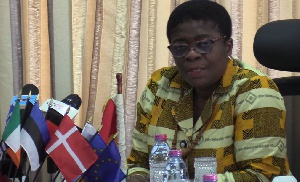The Chief Director at the Ministry of Interior Adelaide Anno-Kumi has disclosed that the government's efforts to reduce the illegal movement of Ghanaians to European countries are holding positive results.
The Chief Director backed her assertions by referring to recent data obtained from the International Organisation for Migration.
According to the figures she put forth, the incidence of migration across the desert and Mediterranean to Europe has declined from over 5, 700 in 2016 to less than 500 in the first half of 2018.
She translated this as meaning Ghanaians are more educated about the dangers associated with the movement which often put their lives at risk.
Furthermore, the Chief Director told the gathering that the number of Ghanaians deported from EU countries has also seen a decline from 603 persons in 2017 as against 723 in 2016.
"Statistics from IOM Ghana has it that migration across the desert and the Mediterranean Sea to Europe in 2016 was 5756. In 2017, it decreased to 4046 and from January to July 2018 decreased to 497. The decline suggests that fewer Ghanaians are now embarking on often-dangerous perilous journeys through the Sahara desert to seek economic opportunities in Europe. Ghanaians are therefore enlightened about the dangers associated with irregular migration" she remarked in her welcome address at the foreign affairs ministry in Accra.
Adelaide Anno-Kumi noted that the significant achievement was due to governments priorities it set for itself.
The Interior ministry Chief Director indicated that the strides achieved emanates from Ghana's contribution to the fight against illegal migration.
To address the issue of illegal movement, the government placed priorities on addressing the root causes and drivers of irregular migration including rural-urban migration, addressing growing food insecurities, enduring irregular migrant returns indignified and well within the reception and reintegration capabilities of government and private sector-led growth.
Consequentially, to give life to the framework set, Adelaide Anno-Kumi emphasised "government has initiated a number of programmes to minimise or eventually curb the push factors of irregular migration embarked on by the youth. Government intervention programmes put in place to create jobs and tackle the root causes of irregular migration includes the following initiatives; 1D1F, 1village, 1Dam, Planting for food and Jobs, Nation Builders Corps, Promoting private investment, Free SHS, and recruitment into security services" she enumerated.
On her part, the Diana Acconcia, Head of EU delegation to Ghana admitted there was some work being done by the government but insisted that more could be done.
She expressed EU countries' preparedness to work with countries like Ghana to resolve and reduce drastically the issues of illegal migration to curb the associated risks.
The comments were made at a joint Ghana-EU dialogue on migration held at the Ministry of Foreign Affairs Office in Accra on Wednesday.
The issues that were discussed include; addressing the root causes of migration, improving upon visa regime, promoting circular migration, enhancing trade and investment to minimise push factors.
They also deliberated on the EU-Ghana Joint Roadmap, which is a follow-up to the Joint Action Plan on Migration Management Joint Action Plan based on the Five Valletta Pillars.
In a media interview after the deliberations, Head of the Ghanaian team and Chief Director of the Foreign Affairs and Regional Integration Ministry, Ambassador Albert Yankey said the deliberations concluded with both sides agreeing to some key points.
He disclosed that several action plans and activities have also been agreed on to ensure that local artisans who form a majority of those likely to move through illegal routes to Europe are equipped with skills and enhanced livelihoods to make them stay in Ghana and contribute to the economy.
"One of the good programmes of students and researchers is what they call recirculation. You leave Ghana, you go to Germany, France, the Netherlands, you go and study and then you come back. You come back with skills and then you come and invest in our economy. The problem with circular migration is that we don't really have the data but we are hoping to have the data and we can have a structured circular migration in which artisans - carpenters, masons, blacksmiths, electricians - because they form the bulk of those who go, they can go properly within a proper fashion and then come back to Ghana with their newly acquired skills" he disclosed.
The first of such meeting was held in Malta, Valletta in 2015 to address the growing concerns around illegal movements into Europe.
General News of Wednesday, 16 January 2019
Source: www.ghanaweb.com

















